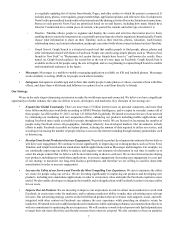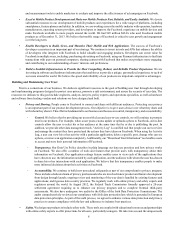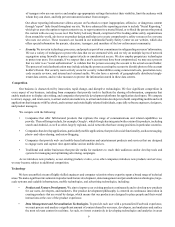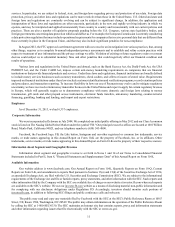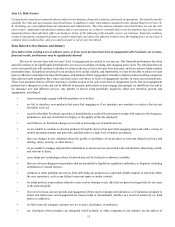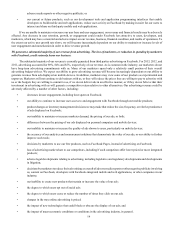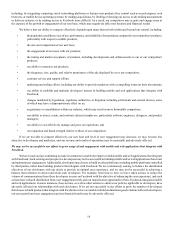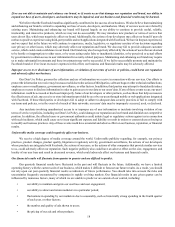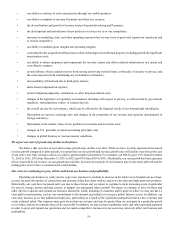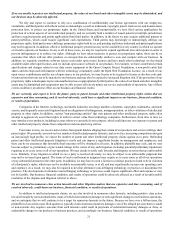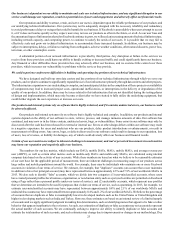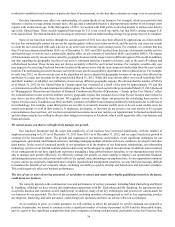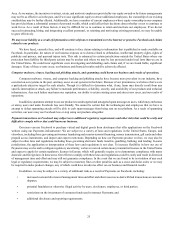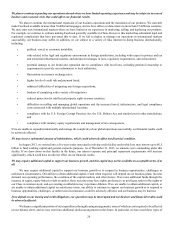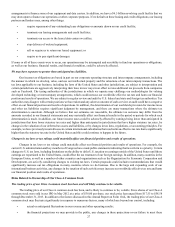Facebook 2013 Annual Report Download - page 19
Download and view the complete annual report
Please find page 19 of the 2013 Facebook annual report below. You can navigate through the pages in the report by either clicking on the pages listed below, or by using the keyword search tool below to find specific information within the annual report.17
We may not be successful in our efforts to further monetize how developers use Facebook.
We currently generate revenue from developers that use Facebook in several ways, including ads on pages generated by
developers' applications on the Facebook website, direct advertising on Facebook purchased by developers to drive traffic to their
mobile and web applications, and fees from developers' use of our Payments infrastructure to sell virtual and digital goods to users
accessing Facebook via personal computers. Applications built by developers of social games are currently responsible for substantially
all of our revenue derived from Payments, and the majority of the revenue from these applications has historically been generated by
a limited number of the most popular games. In addition, a relatively small percentage of our users have transacted with Facebook
Payments. If the Facebook-integrated applications that currently generate revenue fail to grow or maintain their users and engagement,
if developers do not continue to introduce new applications that attract users and create engagement on Facebook, if developers reduce
their advertising on Facebook, if we fail to maintain good relationships with existing developers or to attract new developers who
build products that integrate with Facebook, or if Facebook-integrated applications outside of social games do not gain popularity
and generate significant revenue for us, our financial performance and ability to grow revenue could be adversely affected.
Additionally, we are actively supporting developers' efforts to develop their own mobile and web applications that integrate
with Facebook. Unlike applications that run within the Facebook website which enable us to show ads and offer Payments, we generally
do not directly monetize from developers' integrating their own mobile and web applications with Facebook. Therefore, our developers'
efforts to prioritize their own mobile or web applications may reduce or slow the growth of our user activity that generates advertising
and Payments opportunities, which could negatively affect our revenue. Although we believe that there are significant long-term
benefits to Facebook resulting from increased engagement on Facebook-integrated mobile and web applications, these benefits may
not offset the possible loss of revenue, in which case our business could be harmed.
Action by governments to restrict access to Facebook in their countries could substantially harm our business and financial results.
It is possible that governments of one or more countries may seek to censor content available on Facebook in their country,
restrict access to Facebook from their country entirely, or impose other restrictions that may affect the accessibility of Facebook in
their country for an extended period of time or indefinitely. For example, access to Facebook has been or is currently restricted in
whole or in part in China, Iran, and North Korea. In addition, governments in other countries may seek to restrict access to Facebook
if they consider us to be in violation of their laws. In the event that access to Facebook is restricted, in whole or in part, in one or more
countries or our competitors are able to successfully penetrate geographic markets that we cannot access, our ability to retain or
increase our user base and user engagement may be adversely affected, we may not be able to maintain or grow our revenue as
anticipated, and our financial results could be adversely affected.
Our new products and changes to existing products could fail to attract or retain users or generate revenue.
Our ability to retain, increase, and engage our user base and to increase our revenue depends heavily on our ability to create
successful new products, both independently and in conjunction with developers or other third parties. We may introduce significant
changes to our existing products or develop and introduce new and unproven products, including using technologies with which we
have little or no prior development or operating experience. If new or enhanced products fail to engage users, developers, or marketers,
we may fail to attract or retain users or to generate sufficient revenue, operating margin, or other value to justify our investments, and
our business may be adversely affected. In the future, we may invest in new products and initiatives to generate revenue, but there is
no guarantee these approaches will be successful. For example, we recently began showing ads on Instagram in the United States and
we cannot assure you that these ads will generate meaningful revenue for our business. If we are not successful with new products or
new approaches to monetization, we may not be able to maintain or grow our revenue as anticipated or recover any associated
development costs, and our financial results could be adversely affected.
We prioritize user growth and engagement and the user experience over short-term financial results.
We frequently make product decisions that may reduce our short-term revenue or profitability if we believe that the decisions
are consistent with our mission and benefit the aggregate user experience and will thereby improve our financial performance over
the long term. For example, from time to time we may change the size, frequency, or relative prominence of ads in order to improve
ad quality and overall user experience. Similarly, from time to time we update our News Feed ranking algorithm to deliver the most
relevant content to our users, which may adversely affect the distribution of content of developers and marketers and could reduce
their incentive to invest in their development and marketing efforts on Facebook. We also may introduce changes to existing products,
or introduce new stand-alone products, that direct users away from properties where we have a proven means of monetization. For
example, we have taken action to redirect users who send messages from within the Facebook application to our stand-alone Messenger
application, although we currently do not monetize the stand-alone Messenger application. In addition, we plan to focus on growing
the user base for Instagram and potentially other stand-alone applications that may have limited or no monetization, and it is possible
that these efforts may reduce engagement with the core Facebook application. These decisions may not produce the long-term benefits
that we expect, in which case our user growth and engagement, our relationships with developers and marketers, and our business
and results of operations could be harmed.


